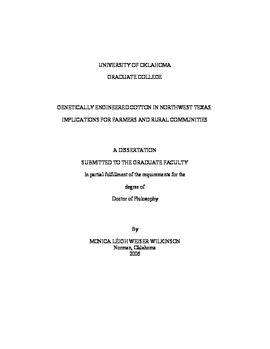| dc.contributor.advisor | Offen, Karl, | en_US |
| dc.contributor.author | Wilkinson, Monica Leigh Weiser. | en_US |
| dc.date.accessioned | 2013-08-16T12:20:05Z | |
| dc.date.available | 2013-08-16T12:20:05Z | |
| dc.date.issued | 2006 | en_US |
| dc.identifier.uri | https://hdl.handle.net/11244/1011 | |
| dc.description.abstract | The purpose of this research is to examine how genetically, engineered cotton has impacted northwest Texas farmers and the communities in which they live. Accounting for over 30% of the nation's total, Texas is the leading producer of cotton in the United States. The majority of Texas cotton is produced atop the Ogallala Aquifer on the northwest Texas plains. I use an applied community approach to examine two cotton-farming communities in this region. Farmers from Hale Center grow predominantly irrigated cotton whereas farmers in Elliott, my home community, raise dryland cotton. Over 90% of cotton farmers surveyed in these communities grow genetically engineered cotton. | en_US |
| dc.description.abstract | Transgenic technologies initially made cotton production easier and appear to have very few immediate or perceived costs. But the true costs of these technologies have threatened the long-term viability of Texas farm families and rural communities. Cotton-growing farmers and their communities are at risk from biotechnology corporations and genetically engineered seeds in that they limit and control farmers' choices in seed, increase their dependency on agribusinesses, especially agribiotechnology and chemical corporations, increase the use of pesticides, encourage monoculture practices, further the consolidation of land, and reduce the number of cotton-related jobs in rural areas. | en_US |
| dc.description.abstract | Most often, concern about GE crops and food revolves around the environment or human health. My research is different in that it examines the social implications of the technology. It asks: What are farmers' key motivations for planting GE cotton? How do they understand the risks and benefits of adoption? And my key concern, how have farmers' adoption of genetically engineered crops (specifically cotton) changed the ways in which they manage their land, and have these changes threatened the vitality of family farms and rural communities in northwest Texas? | en_US |
| dc.format.extent | xiii, 267 leaves : | en_US |
| dc.subject | Cotton Texas. | en_US |
| dc.subject | Cotton Genetics. | en_US |
| dc.subject | Geography. | en_US |
| dc.subject | Agriculture, General. | en_US |
| dc.subject | Genetic engineering. | en_US |
| dc.subject | Economics, Agricultural. | en_US |
| dc.subject | Transgenic plants Texas. | en_US |
| dc.subject | Cotton farmers Texas. | en_US |
| dc.title | Genetically engineered cotton in northwest Texas: Implications for farmers and rural communities. | en_US |
| dc.type | Thesis | en_US |
| dc.thesis.degree | Ph.D. | en_US |
| dc.thesis.degreeDiscipline | Department of Geography and Environmental Sustainability | en_US |
| dc.note | Source: Dissertation Abstracts International, Volume: 67-02, Section: A, page: 0672. | en_US |
| dc.note | Adviser: Karl Offen. | en_US |
| ou.identifier | (UMI)AAI3207899 | en_US |
| ou.group | College of Atmospheric & Geographic Sciences::Department of Geography and Environmental Sustainability | |
